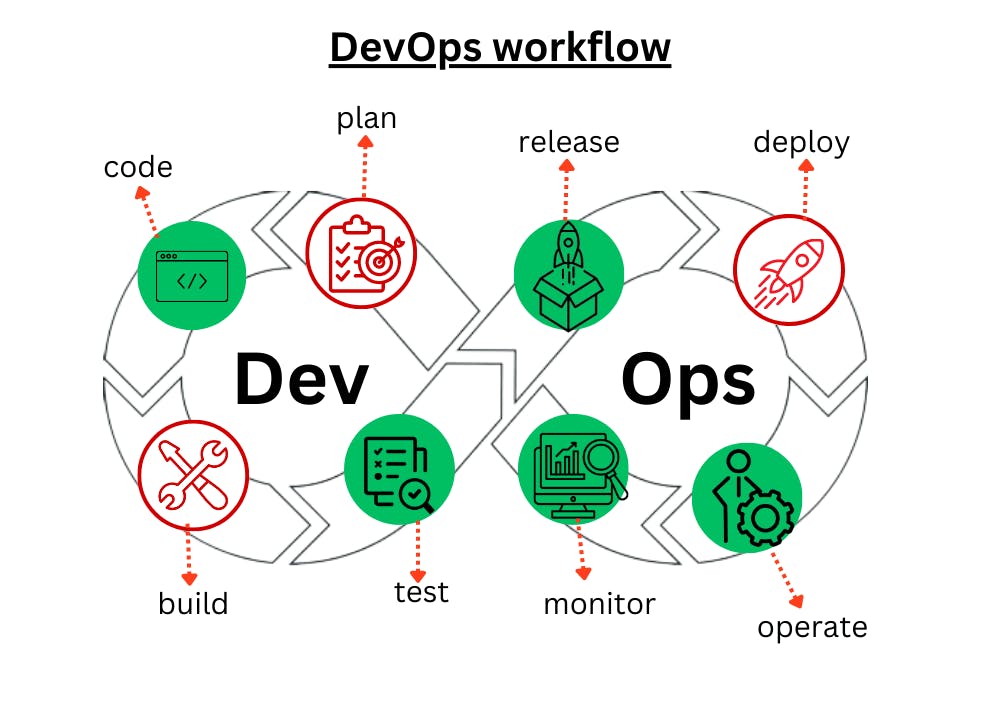What is DevOps
Table of contents
Welcome to the world of DevOps
DevOps is a set of practices that combines software development (Dev) and IT operations (Ops), aiming to shorten the system development life cycle and deliver high-quality software continuously.
or
DevOps is a combination of two words: "Development" and "Operations." It's not just a set of tools but a philosophy that aims to fill the gap between developers and operations teams.
The goal? To deliver high-quality software faster, more reliably, and with fewer interceptions.
or
DevOps is a methodology that allows a single team to manage the entire SDLC (software development life cycle), that is developing, testing, deployment, and operation.

Why DevOps
Faster Delivery
Improved Collaboration
Reduced Errors
Enhanced Feedback Loops
Key DevOps Principles:
Collaboration: Working like a team of friends, sharing ideas and tasks, so everyone knows what's happening, like playing together instead of alone.
Automation: Having a computer robot do the boring tasks for you, like a helpful friend, so you can focus on more interesting things.
Continuous Integration (CI): Like building a puzzle together, adding your pieces as soon as they're ready, so you can see the complete picture bit by bit.
Continuous Delivery (CD): Similar to magic pizza delivery, as soon as the code is ready, it automatically goes to where it needs to be without someone carrying it there.
Infrastructure as Code (IaC): Infrastructure as Code involves managing and provisioning infrastructure through code rather than manual processes. In AWS, tools like AWS CloudFormation allow users to define and provision AWS infrastructure in a declarative manner.
or
It's like having a recipe for your computer setup, so you can easily recreate it or share it like using a cooking book for computers.
Road Map to start the DevOps journey
Learn Linux Basics:
Familiarize yourself with basic Linux commands, file systems, permissions, and shell scripting.
Learn about package management systems (e.g., apt, yum) and basic system administration tasks.
Version Control:
Learn a version control system, such as Git. Understand branching, merging, and basic workflows.
Set up a Git repository and practice collaborating with others using Git.
Scripting and Automation:
Improve your scripting skills with languages like Bash or Python. Automation is a core aspect of DevOps.
Automate routine tasks using tools like Ansible, Puppet, or Chef.
Infrastructure as Code (IaC):
Understand the concept of Infrastructure as Code.
Learn tools like Terraform or Ansible for provisioning and managing infrastructure.
Containerization:
Learn about containerization with Docker. Understand container basics, Dockerfile, and Docker Compose.
Explore container orchestration tools like Kubernetes for managing and scaling containerized applications.
Continuous Integration (CI):
Set up a CI/CD pipeline using Jenkins, GitLab CI, or Travis CI.
Practice automating builds, tests, and deployments.
Continuous Deployment (CD):
Explore continuous deployment practices and tools.
Understand blue-green deployments and canary releases.
Monitoring and Logging:
Learn about monitoring tools like Prometheus and Grafana.
Understand logging systems like ELK (Elasticsearch, Logstash, Kibana) or alternatives.
Collaboration and Communication:
Familiarize yourself with collaboration tools like Slack, Microsoft Teams, or similar.
Understand how to integrate these tools with your DevOps processes.
Security:
Learn about DevSecOps and integrate security practices into your pipelines.
Understand basic security measures for Linux systems and applications.
Cloud Services:
Gain proficiency in a cloud platform such as AWS, Azure, or Google Cloud.
Learn about cloud-native services and how to deploy applications in the cloud.
Networking Concepts:
Understand networking concepts, including firewalls, load balancing, and DNS.
Explore tools like Nginx or HAProxy for load balancing.
Stay Updated:
- DevOps is a rapidly evolving field. Follow industry blogs, attend webinars, and participate in forums to stay informed about the latest trends and technologies.
Hands-On Projects:
- Apply your knowledge through hands-on projects. Set up a personal project or contribute to open-source projects.
Soft Skills:
- Develop soft skills such as communication, collaboration, and problem-solving. DevOps is not just about tools but also about culture and collaboration.
Conclusion:
As we conclude our exploration of the fascinating world of DevOps, I hope you've enjoyed delving into its intricacies and insights. We've covered the roadmap and learned together, but remember, the journey is far from over.
road map Coming soon